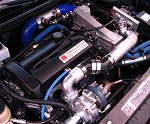Taming
Detonation
by:Titan
Detonation or pre ignition occurs when the air/fuel mixture ignites
before the piston reaches top dead center. On a turbo charged engine
this is the first and last sign of bad things to come. Detonation
can turn a daily driver engine into scrap very quickly. This article
will cover a few easy ways to prevent detonation from happening.
There are several easy modifications that you can do that will
help prevent engine detonation. Some of these are more easily accomplished
than others but they all address the same problem. The idiom, "A
ounce of prevention is worth a pound of cure" holds true with
detonation. It's better to take steps that reduce the chances of
detonation before it sets in.
Increase the octane rating of your fuel
Low octane fuel tends to burn too rapidly for proper combustion
to take place, increasing the octane rating allows for a longer
burn. Many people have used toluene, which has an octane rating
of 110, to increase the octane rating of their fuel. This can easily
be done with the following equation.
[ (gal x octane) + (gal x octane)] / total number of gallons.
[(5gal x 92oct) + (3gal x 110oct)] / 8 = 98.75 octane
Do not exceed 20% toluene.
Use a colder spark plug
In a turbo application the standard spark plugs tend to retain too
much heat from the combustion chamber. This increased heat can ignite
the air/fuel mixture before the spark plug fires. Premature combustion
can create tremendous forces on the piston if it occurs before the
piston has reached top dead center.
Lower your engine's intake temperature
Lowering the engine's intake temperature increases the density of
the air and reduces the temperature of the air/fuel charge. Many
turbo systems that I have seen draw air from the engine bay which
increasing the load on the intercooler. Creating a cold air induction
for your turbo setup that draws air from the wheel well can dramatically
decrease the turbo's inlet temperature. This is a quick and cheap
way to increase your engine's power potential without buying a larger
intercooler.
Combustion chamber carbon buildup
Carbon buildup can produce hot spots inside the combustion chamber.
This has a tendency to ignite the air/fuel mixture before the spark
plug fires.
Decrease engine coolant temperature
Pulling heat out of the combustion chamber can reduce detonation.
Using products like water wetter, purple ice, 40 below, etc. will
all help lower the surface temperature of the coolant. These products
allow the coolant mixture to contact the metal longer providing
superior heat dissipation over standard coolants. Additionally,
you may want to consider an aftermarket fan, which provides increased
cooling capacities in a smaller package.
Use a catch can
The PCV system routes oil fumes from the valve cover back into the
intake. This contaminates the incoming air/fuel charge with hot
oily fumes, which greatly increase the chance of detonation. In
a turbo car this can be disaster. One of the first steps you should
do is incorporate a catch can into your system. A catch can will
condense the oily fumes into the can before they can reenter the
intake.
Causes:
Low octane fuel ((high octane fuel, octane booster
A colder spark plug
Exhaust Gas Recuriculation EGR
Carbon buildup in the combustion chamber (water injection, cabon
cleaning fuel additive)
Hot intake temperatures (cold air intake, larger intercooler)
Decrease engine temp (water wet, increase cooling capacity, aftermarket
fan
Positive crankcase ventilation PCV (catch can, oil air separator)
Too much spark advance timing (retard timing)
|



The turbosaturns.net
forum has become one of the best resources for Saturn performance
on the net. Our members are constantly pushing their cars to new
performance levels. So, log in, share your ideas, and help push
your car’s performance to the next level.

Archived Articles

August 2005 TSN will be holding its first ever meet
in Chardon, Ohio. Some of the fastest Saturns in the country will
be attending. Activities will include drag racing, dyno, tech session,
and BBQ. Look for the latest information in the forums.

Different
Racing

Jeff and his team Different Racing have big plans
on breaking into some really low quarter mile times this year. Last
year he posted a 12.40 on a pretty healthy nitrous shot. This year
he has a new turbo setup and some serious determination. Visit his
website for the latest news and information. I expect we'll be seeing
some low 12's from him by the end of the year.
|





